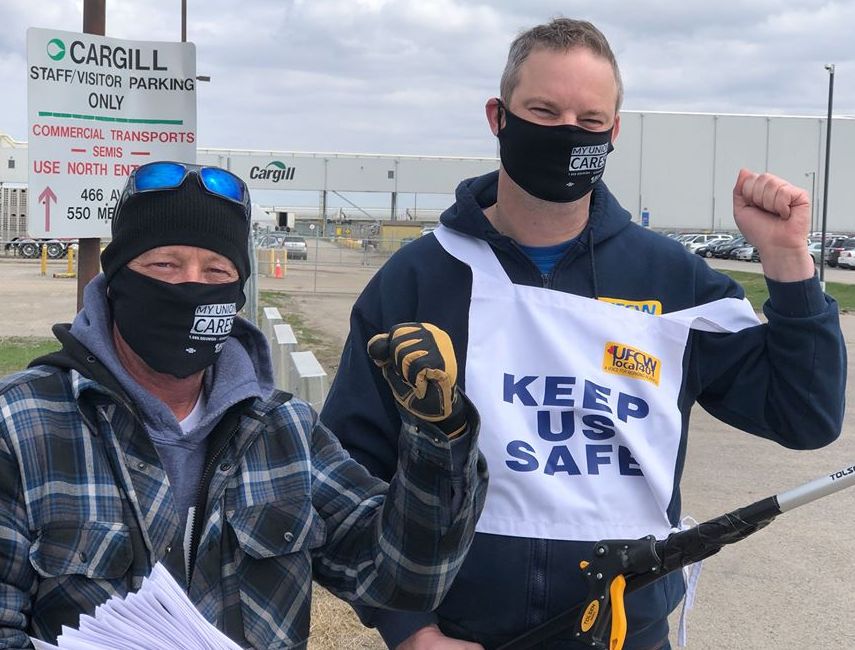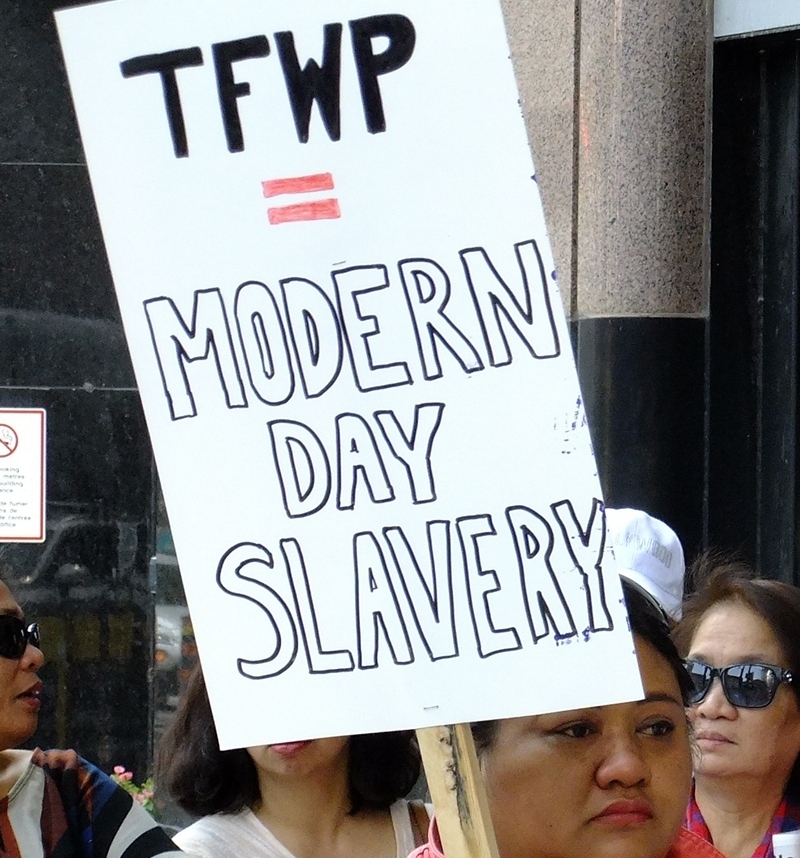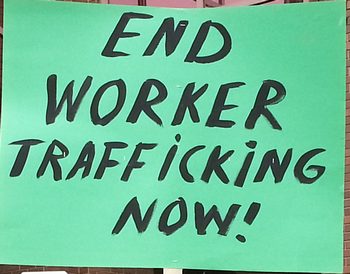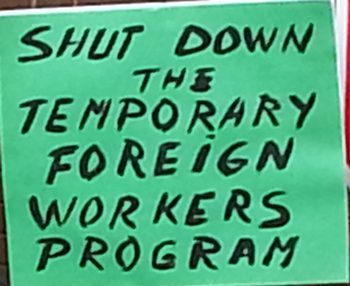|
October 18, 2021 - No. 96
Meat Packing Monopolies Demand
Increase in
Temporary Foreign Workers
Status for All! Immediate Regularization
for All Migrant Workers!
- Peggy Morton -

For Your Information
• Temporary Foreign
Workers in Meat Processing Plants
• Agri-Food Immigration
Program
Meat Packing Monopolies Demand
Increase in Temporary Foreign Workers
- Peggy Morton -
The Canadian Meat Council, which represents
federally registered meat packers and
processing plants, is calling on
the federal government to increase the number
of temporary foreign
workers employers can hire. At present, the
number of temporary foreign
workers is capped at 10 to 20 per cent of the
workforce in each
facility. Any plant which hired temporary
foreign workers prior to 2014
is capped at 20 per cent. The companies are
demanding an increase to 30
per cent of all workers in the plants, or
around 10,000 temporary
foreign workers. They also want a "Trusted
Employer Program" allowing
these employers to hire an additional 10 per
cent of the
workforce as temporary foreign workers -- that
is up to 40 per cent.
The Canadian Meat Council website states that
there are 4,166 empty
stations at meat processing plants across the
country, of a total
workforce of about 34,000. In Quebec, they
report a vacancy rate
approaching 40 per cent, with vacancy rates of
around 20 per cent in
Alberta plants, the council reports.
 "Canadians
do
not want to become butchers," Canadian Meat
Council spokesperson
Marie-France Mackinnon arrogantly declared. As
a result, the meat
packing giants are losing money because they
are forced to reduce
production, she complained. This outrageous
response only goes to
underline the utter disregard of these global
oligopolies for
the workers. The global oligarchs who made
record profits while the
workers became sick and many died now want to
be given the title of
"trusted employer." "Canadians
do
not want to become butchers," Canadian Meat
Council spokesperson
Marie-France Mackinnon arrogantly declared. As
a result, the meat
packing giants are losing money because they
are forced to reduce
production, she complained. This outrageous
response only goes to
underline the utter disregard of these global
oligopolies for
the workers. The global oligarchs who made
record profits while the
workers became sick and many died now want to
be given the title of
"trusted employer."
Workers
in meat processing were particularly hard hit
by COVID-19, with many
deaths. They were subject to threats,
intimidation and bullying,
including the pressure to work sick during the pandemic. It was
only the united actions of the workers and
their unions which forced
the closure of plants where COVID-19 was
running rampant,
and forced the companies to enact safety
measures.
The meat and poultry processing industry was
already notorious for
the inhuman conditions and low wages imposed by neo-liberal
globalization, despite
the militant resistance of the workers. The
dangerous conditions
affecting workers' health and safety did not
begin with COVID-19, but
it did put a spotlight on them. Breakneck line
speeds were, and remain,
a big contributor to the high rate of
workplace injuries and illnesses
long before COVID-19.
The meat packing giants rely heavily on the
most vulnerable workers
including refugees and undocumented workers in
the U.S. and refugees
and workers recruited through the Temporary
Foreign Worker Program in
Canada. This is the deliberate and intentional
neo-liberal model, which
relies on the state to act as a human
trafficker. An example
is the JBS plant in Brooks, Alberta. When U.S.
Tyson bought the plant
in the early 1990's, which is now owned by
Brazilian company JBS, it
expanded from about 500 workers to its present
2,800 workers in a city
which at the time had a population of 12,000.
Brooks now has a
population of about 16,000 people. There is no
way that workers
could be found for such an expansion in Brooks
and surrounding
communities. It is hardly a coincidence that
one of the planned destinations
for settlement of Afghan refugees is
Brooks, along with other
cities in Alberta with meat and poultry
processing plants.
 Low
wages are an integral part of the neo-liberal
model. In 1984, an entry
level job at the Brooks plant, then known as
Lakeside packers, paid
$12.00 an hour, $26.25 in 2021 dollars. The
starting wage in 2021 is
$17.95 to $24.60 for production jobs,
depending on the skill level and
training and education required. Wages remain
far below pre
neo-liberal globalization levels, despite the
long battle to unionize
and the militant strike of 2005 in which the
workers from Sudan played
a leading role. Low
wages are an integral part of the neo-liberal
model. In 1984, an entry
level job at the Brooks plant, then known as
Lakeside packers, paid
$12.00 an hour, $26.25 in 2021 dollars. The
starting wage in 2021 is
$17.95 to $24.60 for production jobs,
depending on the skill level and
training and education required. Wages remain
far below pre
neo-liberal globalization levels, despite the
long battle to unionize
and the militant strike of 2005 in which the
workers from Sudan played
a leading role.
The ruling elite divides the people into
categories such as
Canadians, migrant workers with a path to
permanent residency, migrant
workers with no path to permanent residency,
undocumented workers in a
state of civil death, and so on, in order to
super-exploit those
accorded fewer rights.
Not only must this demand of the meat packing
giants be rejected,
but the Canadian state must be held
accountable for its role in human
trafficking and denial of the human rights of
migrant workers. The
Trudeau government claims that it is offering
a "path to permanent
residency" for workers in this sector through programs such as the
Agri-Food Immigration
Program. However,
the programs serve the
needs of the rich to attract workers despite
their horrendous record of
abuse and negligence, while only a few workers
will be accepted as
permanent residents. This shows the need to
immediately regularize all
migrants, refugees and undocumented people in
the country and
provide them with full immigration status now
without exception. The
solution lies in affirming the rights of
all. Status
for All! is the demand of migrant
workers, migrant advocacy organizations and
the Canadian working class.

For
Your Information
The study
"Foreign workers in the Canadian food
manufacturing industry" was published by
Statistics Canada in April 2021. Workers'
Forum is providing highlights of the
study as concerns the meat processing
industry. The full study can be found here.  The
study defines a "foreign worker" as "... a
temporary resident who is
working in Canada and receiving a T4 slip
(Statement of Remuneration
Paid) from an employer in the food
manufacturing industry. This
captures temporary residents who are
authorized to work with a work
permit under the Temporary Foreign Worker
Program (TFWP)
or International Mobility Program (IMP), as
well as those who are
authorized to work without a permit (e.g.,
refugee claimants), certain
study permit holders and those who hold any
other type of permit except
visitor visas. Permanent residents are not
considered foreign workers. The
study defines a "foreign worker" as "... a
temporary resident who is
working in Canada and receiving a T4 slip
(Statement of Remuneration
Paid) from an employer in the food
manufacturing industry. This
captures temporary residents who are
authorized to work with a work
permit under the Temporary Foreign Worker
Program (TFWP)
or International Mobility Program (IMP), as
well as those who are
authorized to work without a permit (e.g.,
refugee claimants), certain
study permit holders and those who hold any
other type of permit except
visitor visas. Permanent residents are not
considered foreign workers.
According to the study, there were 3,800
temporary foreign workers
in the meat processing sector in 2017, or 3.9
per cent of all workers.
"Foreign workers" in the meat processing
industry are mainly men (76%)
and 88 per cent are under the age of 45 with
more than half under the
age of 35. Close to 90 per cent work in plants
with more
than 100 workers. They are concentrated in the
Prairie provinces (43%)
and in Quebec (33%). The majority are not
recruited through the TFWP,
but through the International Mobility Program.[1]
The study showed a large wage gap between
"foreign workers" and all
workers in Canada. Across all industries,
"foreign workers" make up 2.9
per cent of all workers but earn only 1.6 per
cent of all wages. In
meat processing they make up 3.9 per cent of
all workers, but earn only
2.4 per cent of all wages paid.
Permanent Residency
Another significant finding of the study is
the decline in the
number of temporary foreign workers who get
permanent resident status.
The study covers the years 2005 to 2017.
The study looked at workers who obtained
their first work
permit between 2005 and 2013. It found
that almost two-thirds
(63.2%) of the 2005 entry cohort made a
transition to permanent
resident status at some point between their
entry year and 2018 -- the
end of the observation period. Of the 2005
cohort, 49.5 per cent got
permanent resident status in their first five
years in Canada, and 23
per cent got permanent residency in the first
two years in Canada. In
contrast, only 41.7 per cent of the 2013
cohort made a transition to
permanent resident status in the first five
years following entry
(i.e., from 2014 to 2018), and only 5.4 per
cent made this transition
in the first
two years.
This
shows the impact of the "4 and 4" rule imposed by the Harper government
in 2014. Under this rule, when a temporary foreign worker's work permit
expired, if they had worked in Canada for four years, they would not be
eligible for a new work permit for four years, and were expected to
leave the country. While the Trudeau government removed the rule,
it was completely indifferent to the situation of workers who had
become undocumented because of the rule. It is not known how many
undocumented workers remain in Canada whose employment is not reflected
in the StatsCan study because they work in the "shadow economy."
 Food Processing
Skills Canada (FPSC) conducted a labour market
information study of Canada's meat processing
industry.[2]
The survey states there were 60,000 workers in
the meat processing
industry, and 7,300 vacancies. According to
this study, in 2017, 1,800
workers (or three per cent of the
workforce) were hired through the TFWP. The
study reports that
temporary foreign workers, along with recent
immigrants and refugees,
make up 13 per cent of the industry's
workforce. Food Processing
Skills Canada (FPSC) conducted a labour market
information study of Canada's meat processing
industry.[2]
The survey states there were 60,000 workers in
the meat processing
industry, and 7,300 vacancies. According to
this study, in 2017, 1,800
workers (or three per cent of the
workforce) were hired through the TFWP. The
study reports that
temporary foreign workers, along with recent
immigrants and refugees,
make up 13 per cent of the industry's
workforce.
The study concludes, "Notwithstanding the
success employers have had
with the TFWP, no one sees this as panacea
(e.g., it's very expensive
and out of reach for most companies). Rather
it is viewed as a stop-gap
measure to address an ongoing problem.
Instead, employers are looking
to migration, both domestic and international,
to fill the
labour gap, revitalize their communities and
grow their businesses."
This statement indicates that despite
recruitment of temporary
foreign workers by the global meat processing
giants on a significant
scale for more than 15 years, they still have
a large turnover of
workers because of the unacceptable working
conditions and low wages
which have defined the industry under
neo-liberal globalization.
Despite their
protestations about wanting immigration, not
temporary foreign workers,
the meat processing monopolies continue to
demand increased numbers of
migrant workers, and the trend is that fewer
workers, not more, become
permanent residents.
Notes:
1. International
Mobility Programs
include spouses of "skilled workers" coming
to Canada under the Express
Entry streams, workers transitioning to
permanent residency, spouses of
international students, and international
exchange programs such as
International Experience Canada (IEC) which
provides "working holiday
visas" to youth from
the following countries: Australia, Austria,
Belgium, Chile, Costa
Rica, Croatia, Czech Republic, Denmark,
Estonia, France, Germany,
Greece, Hong Kong, Ireland, Italy, Japan,
Korea (Republic of), Latvia,
Lithuania, Mexico, Netherlands, New Zealand,
Norway, Poland, Portugal,
San Marino, Slovakia, Slovenia, Spain,
Sweden, Switzerland,
Taiwan, Ukraine, and the United Kingdom.
2. For the full Food
Processing Skills Canada (FPSC) labour market information study click
here

The Trudeau government enacted the Agri-Food
Immigration Pilot project in May 2020, which
"provides a pathway to
permanent residence for workers with
full-time, non-seasonal in-Canada
work experience in certain agricultural and
agri-food industries." The
program is capped at a maximum of 2,750
principal
applicants plus their family members annually
for three years, with
applications accepted up to May 14, 2023.
Quebec has a similar program
for up to 550 applicants annually for a five
year period.
The pilot project is open only to workers who
have already worked
for at least one year under the Temporary
Foreign Workers' Program as
non-seasonal farm workers, including
greenhouse and mushroom
production, butchers, retail, wholesale and
industrial meat cutters,
fishmongers, poultry preparers, or labourers
in food and beverage
processing.
Candidates must also meet a Canadian Language
Benchmark level 4 in
English or French and have a high-school
diploma, post-secondary
certificate or degree equal to a Canadian
equivalent. Candidates
currently living in Canada must maintain their
temporary resident
status during the processing of their
application for permanent
residence.
Employers who use the program will be issued
a two-year Labour
Market Impact Assessment (LMIA). Meat
processors will be required to
outline their plans to support the temporary
foreign worker in
obtaining permanent residency. Unionized meat
processors will require a
letter of support from their union, and
non-unionized meat processors
will have to meet additional requirements to
ensure the labour market
and migrant workers are protected,
Immigration, Refugees, and
Citizenship Canada states.

(To access articles
individually click on the black headline.)
PDF
PREVIOUS
ISSUES | HOME
Website: www.cpcml.ca
Email: office@cpcml.ca
|

